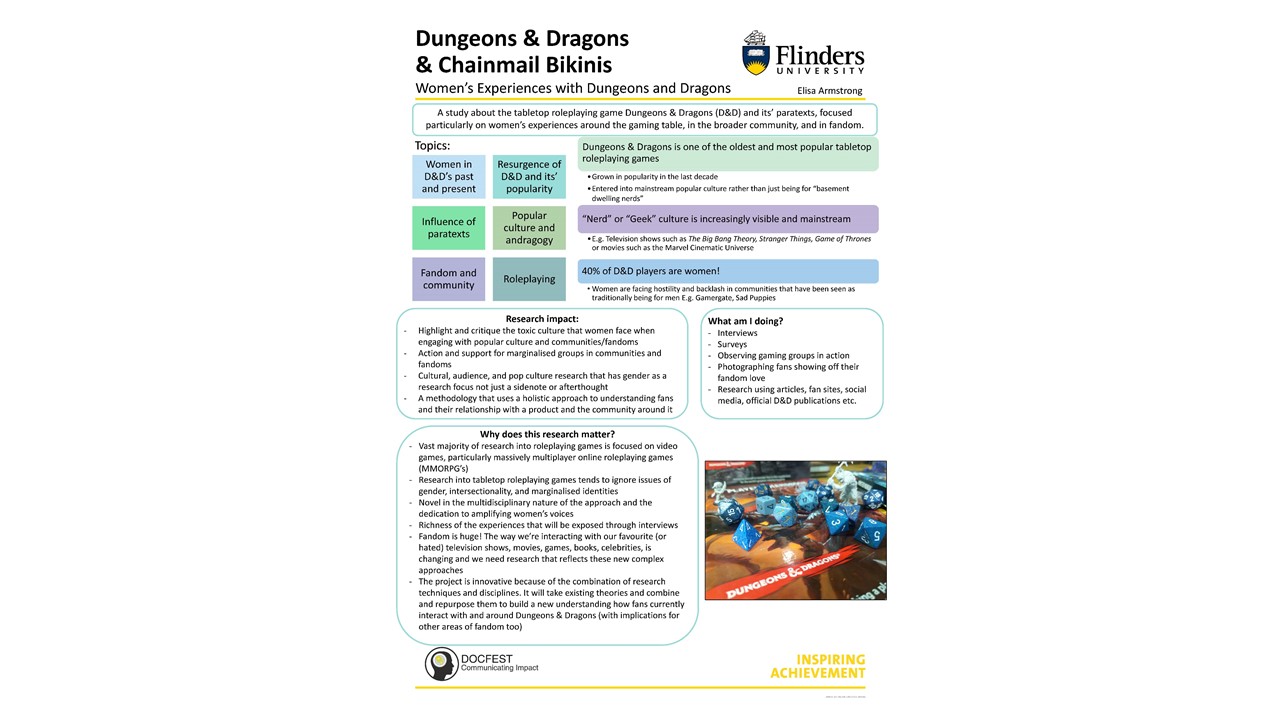
PhD Student, Elisa Armstrong, recently invited people to respond to a survey via social media. The survey has had the most phenomenal response and by midday on Friday the survey had been re-posted 2800 times. The last time we checked in with Elisa, she said that the survey had been completed by approximately 17,000 people. It had even been sent to her by someone who thought she might be interested because of her research interests!
We asked Elisa to share a bit about her research with us.
How did your interest in Women’s Experiences with Dungeons and Dragons develop?
I first wanted to play Dungeons and Dragons when I was in high school – I was lucky enough to go on holiday to America and I found a Starter Set for 4th Edition. I brought it back, eager to play… and couldn’t find anyone to play with! When I started university, I met a bunch of like minded nerds and finally got to play. I fell in love with the game and started playing with lots of other groups. I found that often I was the only woman at the table, or if there were other women, we were vastly outnumbered. I got treated differently – creepy advances, being patronised, etc. I found it incredibly frustrating, and it led to me taking a break from playing until I could find a group I really trusted. I guess my interest in women’s experiences sprung naturally from my own experiences and a desire to make sense of them.
What was it that inspired you to do a PhD in this area?
I have always sought out other women who play D&D to compare experiences and feel less isolated. There are so many horror stories on Reddit and social media about women who are just trying to play a game but jump through so many hoops and face so much disgusting behaviour. When I was considering doing a PhD, I wanted to do it on an area that was personally meaningful but that had the potential to have a positive impact on others. D&D is having a massive moment culturally, so now seemed the ideal time to seize that visibility and relevance to explore women’s experiences in fandom.
Have you made any discoveries that surprised you?
I was massively surprised by how sexist the first edition of D&D was. I suspected there would be some sexist elements due to the time of its release and the cultural context or hobby it grew from but what I found still left me bewildered. Women’s strength scores were reduced and as such their ability to play “Fighters” was limited. They also used “Beauty” instead of “Charisma”. There are articles in Dragon Magazine arguing for and against these decisions – and ultimately, they do not carry through into the next edition. I’ll admit that at first these ridiculous limitations made me laugh, but then I realised the impact they must have had for women who wanted to play. I have so much respect for the women who really challenged their communities and overcame the barriers to entry they faced to play D&D back then – and through to now.
What is the most inspiring aspect of doing a PhD?
I love the freedom. I can find a thread of something and really chase it for as long as I want. I’ve been able to explore other disciplines and theories that I never would have been brave enough to touch in my undergrad (or even during my masters). It’s kind of liberating to choose your own direction, design your own research, and choose your own pathways. I’m very lucky to have a supervisor who encourages my curiosity rather than forcing a blinkered approach. Some of the most exciting elements of my research so far have come from a “Huh, I wonder what that means” and a couple of hours spent on Google Scholar reading weird stuff. (Though, I do have to occasionally slap my own hand and ask myself if what I’m doing is really just fancy procrastination…)
What advice would you give someone who was thinking about doing a PhD in your field?
Be brave and do it. Find something you’re passionate about and see what you can do with it. I think if you really love your topic, it helps in those dark moments. I can’t imagine going through this process for a topic that didn’t get me excited and fired up.
If you would like to contact Elisa about her research please email arms0092@flinders.edu.au

